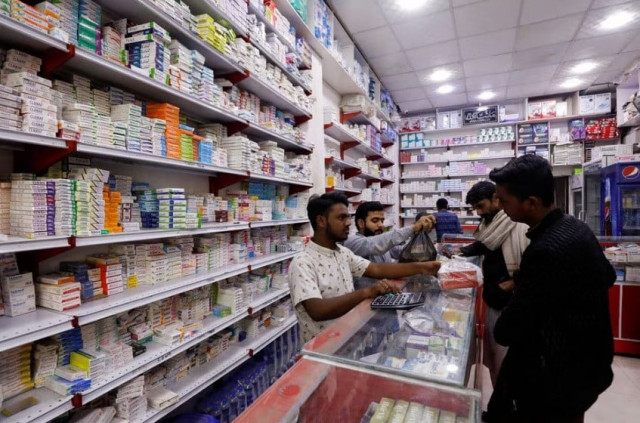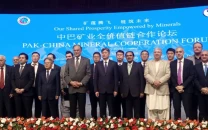Green-light given for 20% hike in drug prices
ECC fixes wheat procurement target at 5 million metric tons for new crop

Inflation-hit people were given another shock on Friday when the Economic Coordination Committee (ECC) of the cabinet approved a rise of up to 20% in retail prices of general medicines and 14% for essential ones, prompting immediate criticism from drug manufacturers who said the increases were too small.
The decision followed a months-long standoff with importers and manufacturers, whose associations have been demanding an across-the-board 39% rise, warning that the industry could otherwise collapse.
The ECC took up the summary of the Ministry of National Health Services, Regulations and Coordination that sought an increase in maximum retail prices of the medicines based on the recommendations of the Policy Board of Drug Regulatory Authority of Pakistan. The increase was demanded to offset the impact of devaluation of the rupee and inflation on the manufacturing cost.
To ensure continuous availability of drugs in the market, the ECC allowed the manufacturers and importers to increase their existing market retail price of essential drugs up to 14%.
Similarly, it allowed increase in the market retail price of all other drugs up to 20% on the basis of average CPI for the current year.
The ECC further advised the policy board to review the situation after three months, i.e., in July and make its recommendations to the federal government regarding price decrease if the rupee appreciates its value, adding that “no increase under this category” would be granted in the next financial year.
Annual inflation rate hit 35% in March, fuelled by a depreciating currency, a rollback in subsidies and the imposition of higher tariffs to secure a bailout package of $1.1 billion from the International Monetary Fund. Food inflation has soared to 47%.
But the government had pushed back against the demands for higher medicine prices, fearing such a move would lose it support months before national general elections.
The Pakistan Pharmaceutical Manufacturing Association (PPMA) criticised the increase, which it said was way lower than it had expected.
Wheat procurement
The ECC fixed the wheat procurement target at 5 million metric tons for Punjab, Sindh and Balochistan for the new crop. The operations would require a total funding of Rs1.16 trillion, according to the Ministry of National Food Security & Research.
By going against its own decision of setting the wheat support price at Rs3,900 per 40kg, the ECC allowed Sindh to procure 1.4 million metric tons of wheat at Rs4,000 per 40kg. The provincial government would borrow Rs214 billion for the purpose, including Rs140 billion for the wheat cost.
The ECC fixed the 3.5 million metric tons wheat procurement target for Punjab for buying the commodity at Rs3,900 per 40kg. The provincial government will take a Rs950 billion loan, including the cost of wheat of Rs346 billion. The rest of the amount has been mentioned as the cost of borrowing and building cushion.
It assigned a 100,000 metric tons procurement target to the government of Balochistan that will buy the commodity at a price of Rs3,900 per 40kg.
The ECC approved Rs35 million additional funds for the Ministry of Interior to set up the passport processing centers (PPCs) at tehsil level in 30 administrative units throughout the country. It also allowed the creation of 30 posts of operational officers in the Department of Immigration and Passports, subject to the approval of the austerity committee.
The ECC’s decision was in violation of the prime minister’s austerity drive, which bars further expansion in the government’s footprints.
The ECC also approved Rs450 million in favour of the Ministry of Interior to meet the operational requirements of the ICT Police regarding its liabilities and training of recruits, according to the finance ministry. A sum of Rs280 million out of the Rs450 million has been sanctioned for hiring of vehicles and containers. Another Rs150 million has been given for providing food to the police personnel.
The committee also decided to enter into a contract with the United States authorities for renting out its closed Roosevelt Hotel, New York, for the stay of immigrants – in a deal that may help settle the pending liabilities, besides making the prime property operational again.
The ECC constituted a committee to negotiate the rental price with the New York City government, as it found the offered $200 per day per room rental price on the lower side. The local authorities have offered $220 million in rent for three years, with a minimum guaranteed period of 18 months.
The committee would also negotiate the severance cost with the sacked employees, who are demanding $56 million in compensation.
A finance ministry handout stated that the Ministry of Aviation submitted a summary on challenges and re-opening of Roosevelt Hotel, New York. It informed that PIA investment Limited (PIA-IL) management has got an opportunity offered by New York City government to utilize the hotel’s 1,025 rooms over a period of three years for migrant business at the rate of $200 per room per day.
The ECC after discussion approved the recommendations of the ministry and approved the formation of a four member negotiating committee led by the Secretary Aviation Division to negotiate with the New York City Government and the Hotel Union, according to the Finance Ministry.
According to the proposed contract, the city government would pay $200 per room per day for the first year, $205 per room for the second year and $210 per room for the third year –a price that is far below the prevailing market rates at the fifth avenue, which is the prime location for the tourists visiting New York.
The negotiation committee will also bargain with the 469 union employees who were sacked when the last Pakistan Tehreek-e-Insaf government closed the hotel in 2020. The settlement cost of the 392 employees is estimated at $56 million, as 77 employees are expected to rejoin once the facility is opened for business.
The ECC also allowed PIA-IL to utilize the funds of $ 1.145 million from the available balance as bridge financing to commence the re-opening work at the Hotel. The management is expected to open 300 rooms by September this year.
At the offered price, the hotel management hopes to earn net roughly $62 million from the three-year deal after settlement of outstanding liabilities and paying union severance cost.



















COMMENTS
Comments are moderated and generally will be posted if they are on-topic and not abusive.
For more information, please see our Comments FAQ